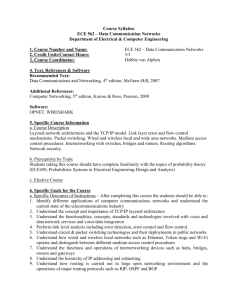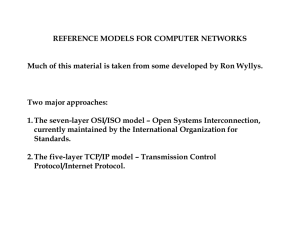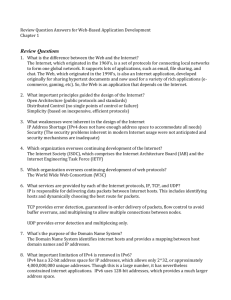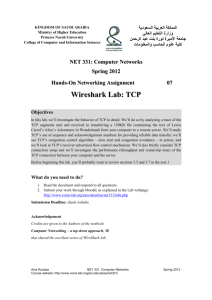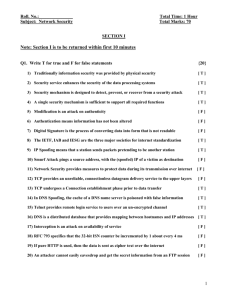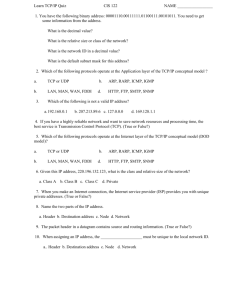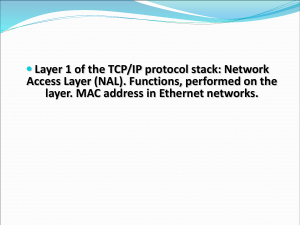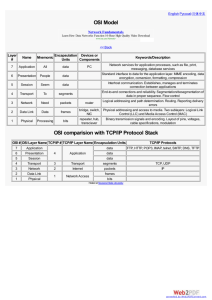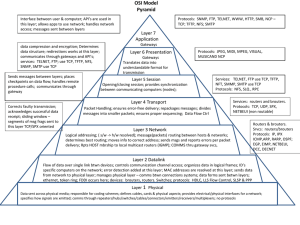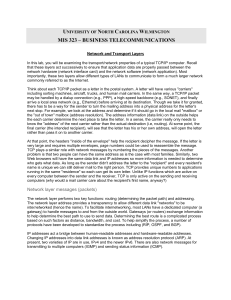CIS507: The Principles of Computer Networks Instructor: {Instructor
advertisement
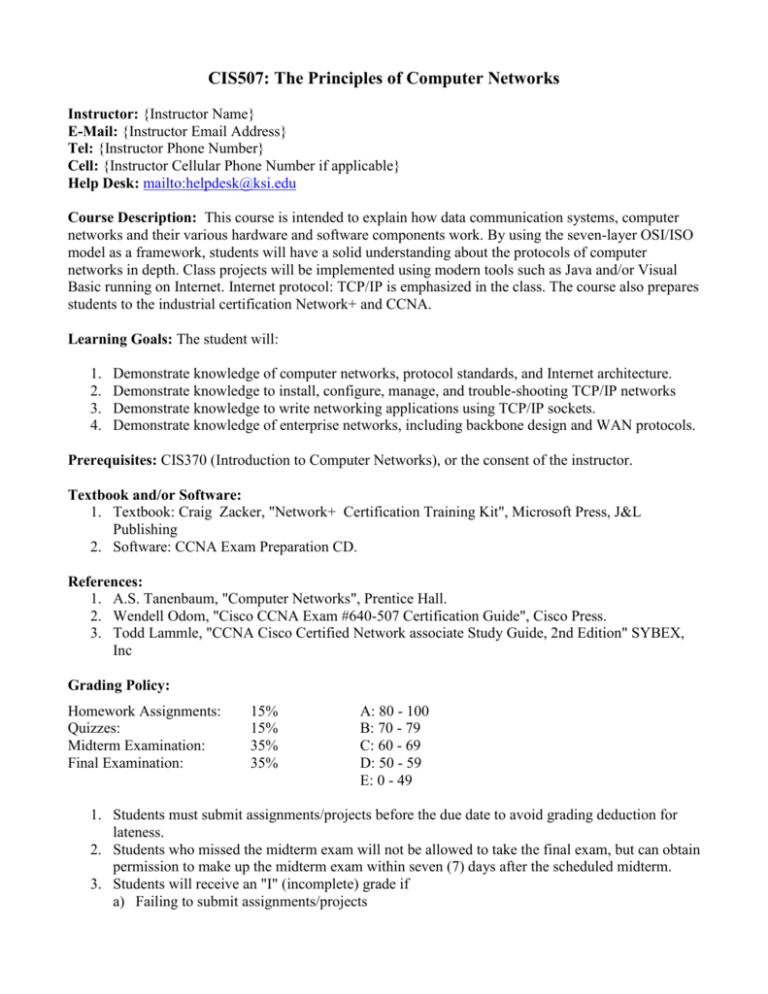
CIS507: The Principles of Computer Networks
Instructor: {Instructor Name}
E-Mail: {Instructor Email Address}
Tel: {Instructor Phone Number}
Cell: {Instructor Cellular Phone Number if applicable}
Help Desk: mailto:helpdesk@ksi.edu
Course Description: This course is intended to explain how data communication systems, computer
networks and their various hardware and software components work. By using the seven-layer OSI/ISO
model as a framework, students will have a solid understanding about the protocols of computer
networks in depth. Class projects will be implemented using modern tools such as Java and/or Visual
Basic running on Internet. Internet protocol: TCP/IP is emphasized in the class. The course also prepares
students to the industrial certification Network+ and CCNA.
Learning Goals: The student will:
1.
2.
3.
4.
Demonstrate knowledge of computer networks, protocol standards, and Internet architecture.
Demonstrate knowledge to install, configure, manage, and trouble-shooting TCP/IP networks
Demonstrate knowledge to write networking applications using TCP/IP sockets.
Demonstrate knowledge of enterprise networks, including backbone design and WAN protocols.
Prerequisites: CIS370 (Introduction to Computer Networks), or the consent of the instructor.
Textbook and/or Software:
1. Textbook: Craig Zacker, "Network+ Certification Training Kit", Microsoft Press, J&L
Publishing
2. Software: CCNA Exam Preparation CD.
References:
1. A.S. Tanenbaum, "Computer Networks", Prentice Hall.
2. Wendell Odom, "Cisco CCNA Exam #640-507 Certification Guide", Cisco Press.
3. Todd Lammle, "CCNA Cisco Certified Network associate Study Guide, 2nd Edition" SYBEX,
Inc
Grading Policy:
Homework Assignments:
Quizzes:
Midterm Examination:
Final Examination:
15%
15%
35%
35%
A: 80 - 100
B: 70 - 79
C: 60 - 69
D: 50 - 59
E: 0 - 49
1. Students must submit assignments/projects before the due date to avoid grading deduction for
lateness.
2. Students who missed the midterm exam will not be allowed to take the final exam, but can obtain
permission to make up the midterm exam within seven (7) days after the scheduled midterm.
3. Students will receive an "I" (incomplete) grade if
a) Failing to submit assignments/projects
b) Missing the final exam.
4. Students will receive an "F" (failing) grade if
a) Attending less than half of the classes;
b) Failing to submit less than half of the assignments/projects;
c) Receiving an "I" (incomplete) grade but still failing to submit the makeup coursework within
thirty (30) calendar days beyond the end date of the course.
5. An “I” (incomplete) grade may be converted to a non-failing grade according to the quality of
any makeup work submitted within thirty (30) days. On the thirty-first (31) day after an “I”
grade is given, the grade will automatically be converted to an “F” grade if no makeup work has
been submitted.
See the handout Knowledge Systems Institute Policy on Academic Dishonesty. Team members are to
cooperate only with members of their own team. Program Submission By the end of Part 3, we will start
a mini project.
Course Contents:
Lecture
Topic
Text
1
Network Basics, ( Network Communications, The OSI Reference Model)
Chapter 1
2
Network Hardware (Network Cables, Network InterfaceAdapters, Network
Hubs)
Chapter 2
3
Network Connections(Bridging, Switching, Routing)
Chapter 3
4
Networking Software(Network Operating Systems, Network Clients,
Directory Services)
Chapter 4
5
Data-Link Layer Protocols (Ethernet, Token Ring, SLIP and PPP)
Chapter 5
6
Network Layer Protocols ( IP, IPX, NetBEUI)
Chapter 6
7
Transport Layer Protocols (TCP and UDP, SPX and NCP)
Chapter 7
x
Midterm Examination
8
TCP/IP Fundamentals (TCP/IP Protocols, IP Addressing)
Chapter 8
9
TCP/IP Routing (Routing Principles, Building Routing Tables)
Chapter 9
10
TCP/IP Applications (TCP/IP Services, TCP/IP Utilities)
Chapter 10
11
TCP/IP Configuration ( Installing the TCP/IP Protocols, Configuring
TCP/IP)
Chapter 11
12
Remote Network Access (Using Remote Connections) & Network
Troubleshooting (Procedures, Identifying Network Components,
Troubleshooting a Network)
Chapter 12
13
Network Security (Password Protection, Security Models, Firewalls, Security Chapter 13
Protocols: IPSec, L2TP, NAT, SSL, Kerberos) & Network Maintenance
(Backups, Anti-Virus Policies, Patches and Updates)
14
Planning the Network (Determining Network Needs, Providing Fault
Tolerance, Collecting Essential Information) & case study
x
Final Examination
Chapter 14
